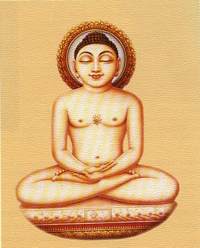
JVB London - Souvenir 2007
on
Ahimsa
Non-violence
Sambodhi by Acharya Mahaprajna
I had received some copies of Sambodbi from Ahmedabad in the year 2000. The books were sent to me by Mr. Bhandari and were meant to be given to a few individuals. Any book written by the highly respected Acharya Mahaprajna attracted me and was a great source of inspiration to me. When I saw the book and flicked through a few pages, I wondered 'How come I have not seen this book before?'. As it was composed in Sanskrit verses, my inquiring mind tried to pursue the source and the name of the original writer of these verses. But to my surprise and delight, I found that all the verses were composed with an extremely scholarly approach by Acharyaji himself.
The book is in the form of questions and answers. Meghakumar, one of the disciples of Bhagawan Mahavir, asks various questions to Mahavir. Mahavir explains everything beautifully to Meghakumar. It is quite likely that this series of questions are the questions that could be raised by any sadhaka seeking spirituality and moksha but what is significant is that the answers provide us the essence of what Bhagawan Mahavir taught and what is written in the Agamas. This is what makes the book highly readable and one can say that this book is like a scripture in itself.
I wish to share here some of the points and excellent interpretations given in the book. Let us see chapter No 5:
Meghakumar asks Bhagawan Mahavir: "I know the meaning and importance of real happiness -the happiness of moksha. I want to know about the way we can achieve that everlasting happiness."
Bhagawan replies: "First of all gyan, darshan and charitra are the required tools for moksha and the path is called dharma (religion). The first characteristic of a religion is ahimsa and the second is tolerance (patience). Practice of ahimsa requires keeping patience in all types of difficulties. Moksha is the goal. Dharma is the path leading to that goal. Samyaka gyan, darshan and charitra are the main characteristics of the religion.
Ahimsa links us with Samyaka charitra. Darshan convinces us about the atma and gyan shows us the qualities of atma. Ahimsa is placed at the top of spirituality. Ahimsa is the supreme religion. All our knowledge of scriptures would be futile if we cannot practice ahimsa. Ahimsa also means total lack of attachment, aversion and moha. Ahimsa and tolerance are complementary to each other. Himsa encourages fear, worry, opposition and hyper activities.
A man with the virtue of non-violence thinks everyone as his friends and does not harbour any anger towards the ones who harass him. He does not show disgust in the things, which he dislikes and does not show any favour for the things he likes. He is always equanimous. The one who cares for everything around him (apramatta) can practice true ahimsa. He is not afraid of anything either and that's why he is truly a non-violent person."
Ahimsa also means total awareness. Renunciation of mamatva (this is mine or this is me) leads us to bhed-vigyan; the distinction or separation between atma and matter."
I was privileged to study and teach this book to a few teachers at a Jain Pathshala run by Shri Chandana Vidyapeeth here in London. The book certainly helped me rekindle the true spirit of Sambodhi.
 Dr. Vinod Kapashi
Dr. Vinod Kapashi